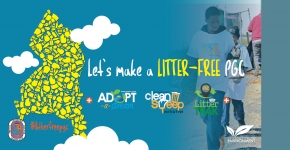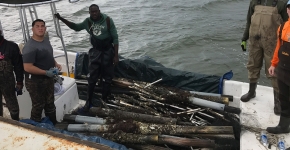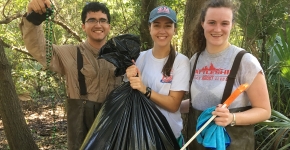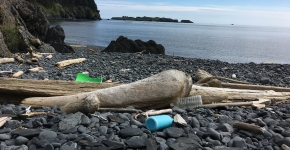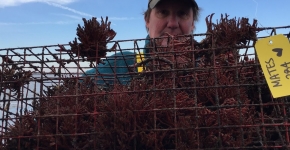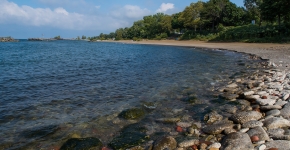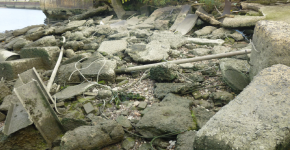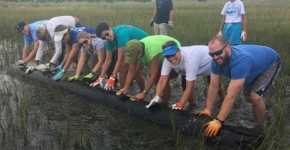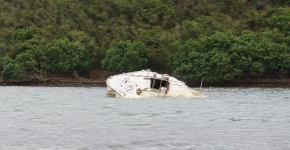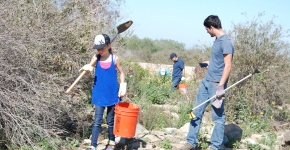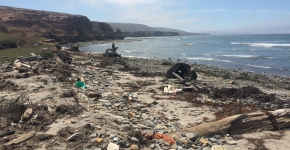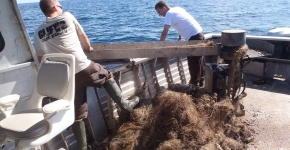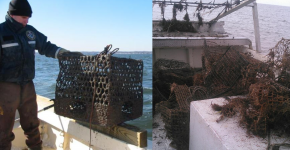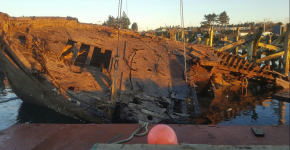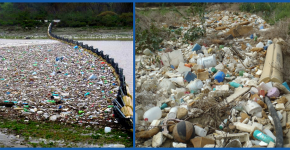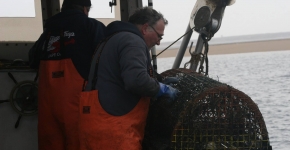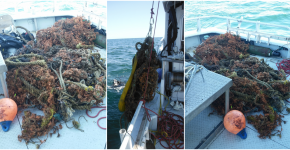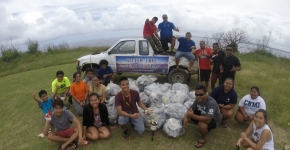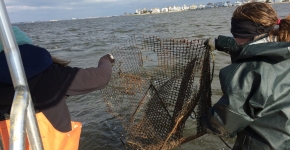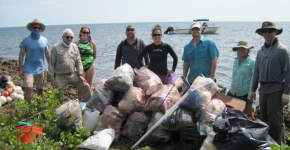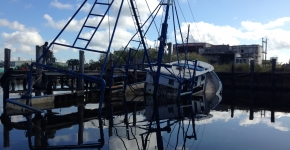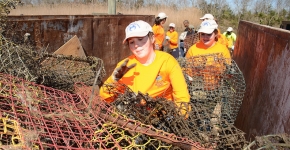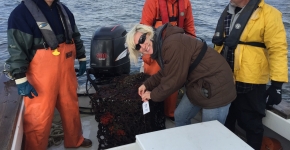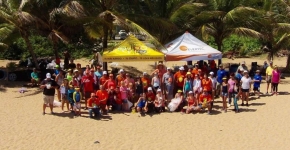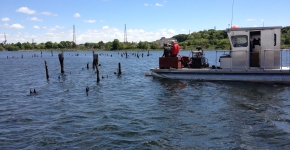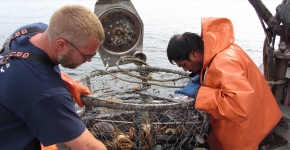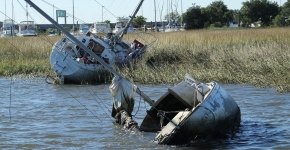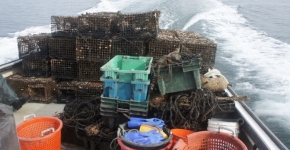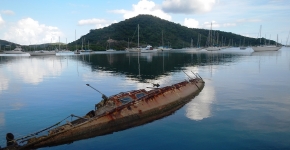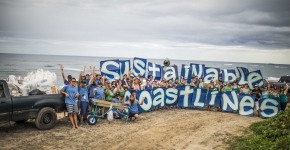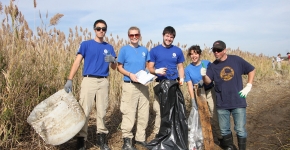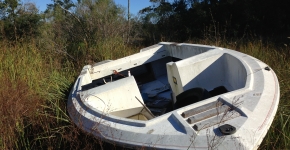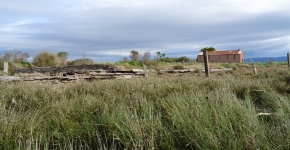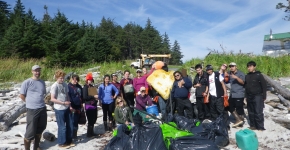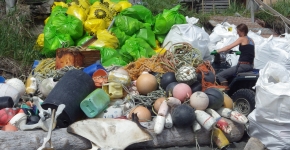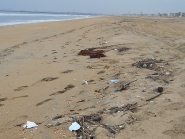Since 1996, multiple NOAA offices have collaborated to remove marine debris from the remote Northwestern Hawaiian Islands.
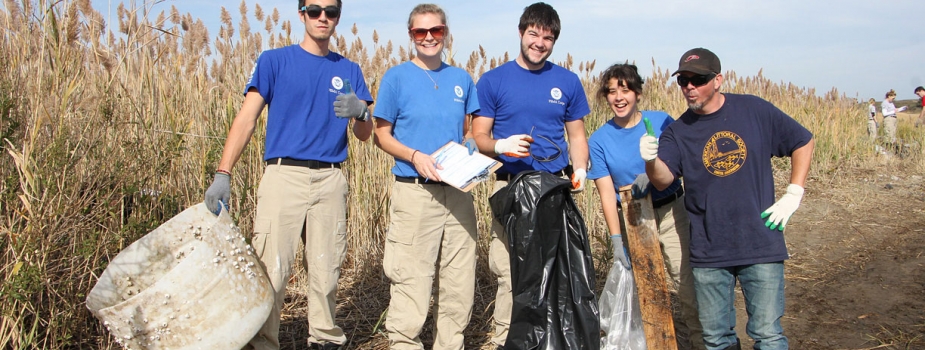
Removal
Each fiscal year (October through September), the Marine Debris Program offers funding that supports locally driven, community-based marine debris removal projects. These projects benefit coastal habitat, waterways, and wildlife including migratory fish.
(Photo Credit: American Littoral Society)
Special Projects
Resources - Links
see also:
2017 Active Projects
-
Save Our Shores is removing large debris items from difficult-to-access areas of three major watersheds that feed into Monterey Bay National Marine Sanctuary.
-
Prince George’s County is working to design, install, and monitor the success of two trash traps along Maryland’s Anacostia River watershed, as well as conduct local outreach.
-
Pacific Coastal Research & Planning is working to remove the derelict F/V Lady Carolina, a grounded vessel in Saipan, as well as leading community outreach to spread awareness of the marine debris issue and proper storm preparation.
-
The North Carolina Coastal Federation is removing derelict aquaculture fishing gear from areas adjacent to Harkers Island, NC, as well as working with stakeholders to develop best management practices for disposal and prevention of aquaculture marine debris.
-
The Mobile Baykeeper is helping Mobile, AL, “Move Toward a Litter-Free Mardi Gras” by organizing cleanups, implementing a media campaign, and purchasing temporary litter barriers for storm drains.
-
Island Trails Network is leading volunteers in removing marine debris on shorelines accessible from the road system in and around Kodiak, Alaska.
-
The Cornell Cooperative Extension Marine Program is working to survey and remove derelict lobster traps in Central Long Island Sound.
-
The Conserve Wildlife Foundation of New Jersey is continuing their work to find and remove derelict crab pots in New Jersey’s southern coastal bays.
-
Cleveland Metroparks is removing construction material from Euclid Beach Park, conducting small-scale marine debris removal, and installing an educational display on the detrimental effects of marine debris in Lake Erie.
-
The Camden County Municipal Utilities Authority is working to remove marine debris as part of a significant urban living shoreline project, the first in urban tidal freshwaters in New Jersey.
-
The Makah Indian Tribe is working to remove three sunken vessels from the Makah Marina in the Makah Tribe Indian Reservation, and is conducting outreach to prevent future ADVs.
2016 Active Projects
-
The Douglas Indian Association is working to survey and remove derelict Dungeness crab pots in a known crab harvest area of Gastineau Channel near Juneau, Alaska.
-
The North Carolina National Estuarine Research Reserve is working with Duke University to use unmanned aerial systems to map and identify marine debris within the Rachel Carson Reserve, using this data to locate and remove debris and monitor restoration of debris-damaged areas.
-
The Puerto Rico Department of Natural and Environmental Resources is working to assess and remove five derelict vessels and to use information from additional removal events to develop prevention strategies for the area.
-
The Southwest Wetlands Interpretive Association is working to capture, remove, and prevent future accumulations of marine debris within the Tijuana River Valley at the border of the United States and Mexico.
-
California State University Channel Islands is removing and monitoring debris on island and mainland shorelines while also developing formal and informal marine debris curriculum and community outreach projects.
-
The University of Wisconsin Sea Grant is working to implement an effective, on-the-ground derelict fishing gear removal program that will improve the safety and quality of the Great Lakes.
-
The New Jersey Audubon, Northstar Marine, and Stockton University are working to locate and remove over 2,000 derelict crab pots from three critical areas of coastal New Jersey and the Delaware Bay.
-
The Delaware Department of Natural Resources and Environmental Control Delaware Coastal Program is working with local commercial crabbers to locate and remove derelict crab pots from two heavily-fished areas of the Delaware Bay.
-
Hawai‘i Wildlife Fund is working with neighbor island partners to conduct community-based marine debris cleanup events and patrols along remote stretches of Hawai‘i, Kaua‘i, Maui, and Lānaʻi coastlines.
-
The Galveston Bay Foundation (GBF) is removing marine debris from navigable waters and habitat areas of Galveston Bay, its sub-bays, and tributaries.
-
The Alabama Department of Conservation and Natural Resources is monitoring and removing derelict crab traps in Southern Alabama.
-
The Oregon State Marine Board is removing the F/V Western, a sunken vessel in Coos Bay, Oregon, as well as performing underwater monitoring at the removal area, creating an inventory of commercial ADVs in Oregon, and initiating an ADV Task Force.
2015 Active Projects
-
The Nature Conservancy and the Quileute Indian Tribe are working to remove derelict crab pots from tribal waters off the Washington Coast and to develop a sustainable reporting and annual recovery program for lost pots.
2014 Active Projects
-
The Tijuana River NERR is working to remove debris and prevent further debris from washing down the Tijuana River Watershed from Mexico.
Completed Removal Projects - Archives
Click the bars below to view completed projects from that year.
2016 Projects
The Sitka Sound Science Center is working with three remote communities to clean up marine debris on local shorelines in the Bering Sea region of Alaska.
The Center for Coastal Studies is using side scan sonar surveys to assess derelict fishing gear abundance and collaborating with commercial fishermen to remove derelict gear in Cape Cod Bay and other areas of Massachusetts Bay.
2015 Projects
The BoatU.S. Foundation is removing a derelict vessel and three large commercial nets from Lake Erie and Ocean City, Maryland.
The Island Trails Network is using kayaks to remove marine debris from 60 miles of shoreline on Shuyak Island in the western Gulf of Alaska.
The Micronesia Islands Nature Alliance reduced littering and illegal dumping in Saipan by providing infrastructure for proper waste management and raising awareness about littering and marine debris through education and outreach.
UC Davis expanded a fishermen-led Dungeness crab derelict gear recovery program, with the intention of making it a self-sustaining effort.
The North Carolina Coastal Federation is expanding a fishermen-led crab pot recovery pilot project into a self-sustaining derelict crab pot retrieval program.
The Coastal Cleanup Corporation and the Biscayne National Park are working to remove marine debris from sea turtle foraging habitat and nesting beaches and educating the public about marine debris.
The City of Bayou La Batre worked to remove 21 abandoned and derelict vessels and other marine debris from the waters of Bayou La Batre, as well as to restore marsh habitat and lead community outreach.
The Louisiana Department of Wildlife and Fisheries is implementing a derelict crab trap removal program, which includes large-scale removal, education and outreach, and volunteer events in the Barataria, Terrebonne, and Pontchartrain basins near New Orleans.
Stockton University and the NOAA Marine Debris Program are removing derelict crab pots from coastal bays in Southern New Jersey and educating and training crabbers on how to prevent and locate lost traps.
The Conserve Wildlife Foundation of New Jersey, with the NOAA Marine Debris Program, is identifying, removing, and assessing the impacts of derelict crab pots in Barnegat Bay, NJ.
Scuba Dogs Society removed marine debris from a Puerto Rican shoreline and implemented an education and recycling station program to reduce marine debris at its source and promote stewardship of local marine habitats.
The NOAA Marine Debris Program teamed up with Clean Bays to remove industrial debris from 18 miles of shoreline and nearshore environments in East Providence, Rhode Island.
2014 Projects
The Nature Conservancy and the Quinault Indian Nation are removing derelict crab pots and developing a sustainable reporting and annual recovery program for lost crab pots on the Washington Coast.
The Regents of UC Davis, Humboldt Fishermen’s Marketing Association and the NOAA Marine Debris Program teamed up to establish a fishermen-led commercial fishing gear recovery and recycling effort in California.
South Carolina Sea Grant Consortium removed derelict vessels and other marine debris using community-based initiatives.
CCE removed derelict lobster traps from Long Island Sound.
Coral Bay Community Council removed derelict vessels, involved locals in marine debris cleanups, and worked with local waste management and recycling groups to reduce marine debris.
LagoonKeepers.org worked to improve the quality of Palm Beach County’s estuarine, coastal, and near-shore marine ecosystems through derelict and sunken boat removal.
Sustainable Coastlines Hawaii and the NOAA Marine Debris Program work together to inspire coastal stewardship through coastal cleanups.
The American Littoral Society piloted a marine debris removal project in New York's Jamaica Bay
2013 Projects
The Sitka Sound Science Center is working to remove approximately 106 tons of marine debris from important areas around local communities across the Bering Sea.
The Northwest Straits Foundation is combating derelict fishing gear in the Puget Sound by removing derelict nets and conducting outreach with local tribes and fishermen about the impacts of derelict gear.
Hawai‘i Wildlife Fund volunteers patrol the Ka‘ū coast on the Big Island of Hawai‘i for marine debris.
KIRC is removing marine debris accumulations on Kaho'olawe Island in Hawai'i.
Hofstra University is removing marine debris from one of New York's last natural salt marshes.
North Carolina Coastal Federation is removing derelict crab pots and re-purposing them into oyster reefs.
NOAA supported the Coastal Cleanup Corporation in its effort to remove marine debris from sea turtle nesting habitat.
NOAA is supporting Dauphin Island Sea Lab's efforts to remove abandoned and derelict vessels in Dog River, Alabama.
NOAA is supporting the indigenous Wiyot Tribe in its effort to remove marine debris from an ancient cultural site.
NOAA supported the Sitka Sound Science Center in efforts to remove tsunami debris from Southeast Alaska and educate Sitka's youth about the impact of marine debris.
2012 Projects
Island Trails Network in Alaska is working to remove marine debris from Tugidak Island, a critical habitat area in the Kodiak Archipelago.
This ongoing debris removal project focuses on an area around Detroit's Belle Isle that is filled with old building material from the city.
2011 Projects
Surfrider Foundation’s Rincón chapter worked to protect Puerto Rico's coral reefs by removing heavy marine debris.
2008 Projects
NOAA is supporting San Diego Unified Port District in efforts to remove marine debris from San Diego Bay.
2005 Projects
The Northwest Straits Initiative has worked in partnership with the NOAA Marine Debris Program to eliminate harmful derelict fishing gear in Puget Sound.
Web Site Owner: OR&R's Marine Debris Division | Office of Response and Restoration | NOAA's Ocean Service | NOAA | US Department of Commerce | USA.gov


